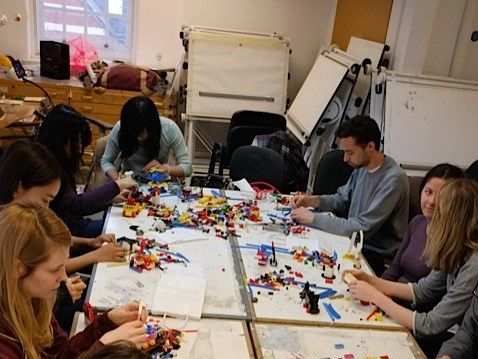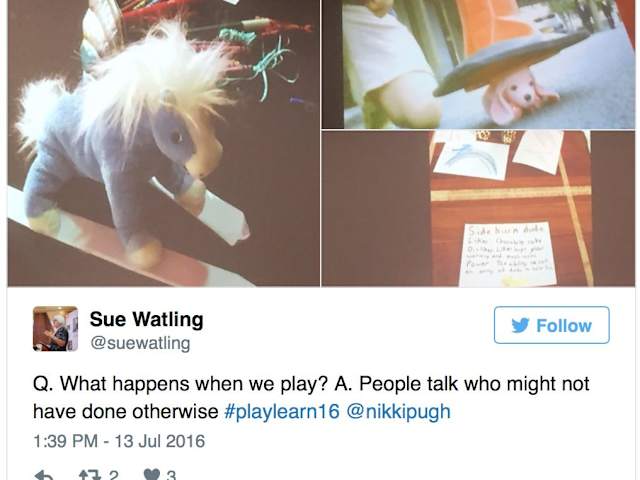
The place and value of play in early years' development and primary education is well understood. There is a vast literature on its importance in childhood, with bodies and events dedicated to play worldwide. In the USA there is a National Institute for Play and an Institute of Play. The International Play Association, Canada is Unleashing the Power of Play in Calgary in September 2017. The International Toy Library Conference and the UK’s The National Playwork Conference are annual fixtures. However, when it comes to play in adult and higher level learning our understanding seems to falter. The true nature, scope and relevance of play becomes reduced to something that children do and grow out of, confined to the social and leisure-based. At worst it is considered trivial or something we do instead of the real and important.
This is to miss out on the magic of play at any age. The play research pioneer and psychiatrist Dr Stuart Brown defines play in its myriad forms as being pleasurable and apparently purposeless. His research evidences too that it is not just fun, but vital to our lives, as when we play we forge new neural pathways in our brains. These foster new ways of thinking and keep our minds alert. Not only this, but from compiling thousands of play case histories, he found that people who play demonstrate greater lightheartedness, empathy and optimism, particularly if they play physically. Other benefits are being detected; research at Oxford University and the Karolinska Institutet in Sweden now suggests that road crash victims who played the computer game Tetris in A&E suffered fewer distressing memories of the event in the weeks afterwards. Play is being recognised through various events; the Counterplay Festival in Sweden is dedicated to playing for better lives while The Tate Modern recently hosted Playing Up, a hands on making and playing event for adults and children alike.

Play has relevance everywhere for good reason. Brown, Pat Kane, Brian Sutton Smith, Robert Fagen and other eminent play theorists argue that it is paramount for human learning, behavioural development and socialisation. Through play we build strength and agility, work out hierarchies and relationships, rehearse ideas and ways of being and chisel out new understandings. All of these are essential to humans remaining agile and responsive in the face of uncertainty and change. It is not rocket science to suggest that right now the university sector needs play and players more than ever.
Our first Play and Creativity Festival at the University of Winchester is informed by these beliefs. For us, play is not just blissful release from the daily grind but a necessary means of relaxing, re-energising and opening ourselves to new perspectives. Sports and other clubs have long provided a place for this at university, however we seek to extend the domain of play – and give ourselves permission to play - within our programmes, research and professional activities. There can be a tendency to regard play with suspicion in the tertiary arena; associating it with ‘edutainment’, dumbing down or being inappropriate for sophisticated enquiry. This assumes that playful engagement with a subject means avoiding difficult or challenging activity. This is a misconception. Learning cannot always be easy, but that does not mean that the tough can never be fun.
Thankfully, in the last three years a palpable shift in the zeitgeist of HE has been detected. Play is starting to be recognised as a valid part of university life in all its forms and aspects. One strand of play, gamification, has become a popular topic in journal articles which recount how the principles, rules and characters of game-playing are being adopted for high level teaching. Chrissi Nerantzi and I have collated many examples of play in two issues of the Creative Academic (CAM2a and 2b, 2015) and are now producing an international collection of play practice in HE for Palgrave Macmillan. Play has suddenly become a hot conference topic, as in the National Teaching Fellow Symposium (2016) and at the PlayLearn conferences at Manchester Metropolitan University (2016/2017). The figure below gives cites one of speaker Nikki Pugh’s reasons why play at university matters:

Festival week offers play events which are purposeful and those which are open and free; from scientific demonstrations conducted through maggot racing and playing catch in the dark, to physical rough and tumble (sitting volleyball). There are gentler outdoor enquiries too; the Secret Life of Campus Tour combines history, geography, biodiversity, environmental sustainability and a nice healthy walk, all in one package. There are games, puzzles, building, crafting, talking and performance, all providing a space in which to talk, create and experiment. All provide the opportunity to come together and learn about a subject and each other in new and unexpected ways.
When we started to plan the Festival we tried to find ‘a good reason’ for doing it. However, the warm response from colleagues and our own ruminations quickly revealed to us that we already had one. It was because we need to.
The views and opinions expressed in this blog are those of the author and do not necessarily reflect the position of the University.